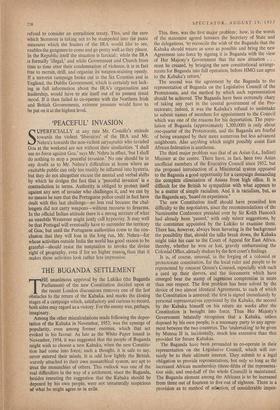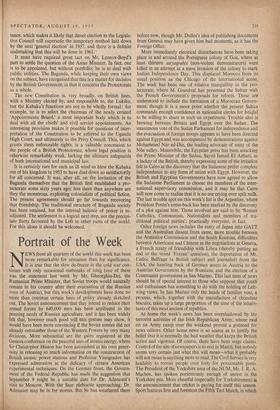THE BUGANDA SETTLEMENT HE unanimous approval by the Lukiko (the
Buganda Parliament) of the new Constitution decided upon at the recent London discussions removes one of the last obstacles to the return of the Kabaka, and marks the closing stages of a campaign which, satisfactory and curious to record, both sides may regard as a victory. For the enemy was, perhaps, imaginary. Among the other miscalculations made following the depor- tation of the Kabaka in November, 1953, was the upsurge of popularity, even among former enemies, which that act evoked in his favour. As late as the White .Paper issued in November, 1954, it was suggested that the people of Buganda might wish to choose a new Kabaka, when the new Constitu- tion had come into force; such a thought, it is safe to say. never entered their minds. It is odd how lightly the British, warmly attached to their own monarchical system, are apt to tteat the monarchies of others. This outlook was one of the real difficulties in the way of a settlement, since the Baganda, besides resenting the suggestion that the Kabaka should be deposed by his own people, were not unnaturally suspicious of what he might agree to in exile. This, then, was the first major problem : how, in the words of the statement agreed between the Secretary of State and the delegations, 'to reconcile the wish of the Baganda that the Kabaka should return as soon as possible and bring the new Agreement into force by signing it in Buganda with the view of Her Majesty's Government that the new situation . . . must be created, by bringing the new constitutional arrange- ments for Buganda into full operation, before HMG can agree to the Kabaka's return.' The second was the agreement by the Baganda to the representation of Buganda on the Legislative Council of the Protectorate, and the method by which such representation should be achieved. The Baganda have been extremely chary of taking any part in the central government of the Pro- tectorate; indeed, it was the Kabaka's refusal to undertake to submit names of members for appointment to the Council which was one of the reasons for his deportation. The popu- lation of Buganda (approximately 1,300,000) is only about one-quarter of the Protectorate, and the Baganda are fearful of being swamped by their more numerous but less advanced neighbours. Also anything which might possibly assist East African federation is anathema.
The third major problem was that of an Asian (i.e., Indian) Minister at the centre. There have, in fact, been two Asian unofficial members of the Executive Council since 1952, but the proposed introduction of a Ministerial system appeared to the Baganda a good opportunity for a campaign demanding the complete elimination of Asians from high office. It is difficult for the British to sympathise with what appears to be a matter of simple racialism. And it is racialism, but, as the Baganda say, 'based on experience.' The new Constitution itself should have presented less diffiCUlty to the negotiators, since the recommendations of the Namirembe Conference presided over by Sir Keith Hancock had already been 'passed,' with only minor suggestions, by the committee appointed by the Lukiko to examine them. There has, however, always been hovering in the background the possibility that, should the talks break down, the Kabaka might take his case to the Court of Appeal for East Africa, thereby, whether he won or lost, gravely embarrassing the Colonial Office, already shaken by the first court's findings. It is, of course, unusual, in the forging of a colonial or protectorate constitution, for the local ruler and people to be represented by eminent Queen's Counsel, especially with such a card up their sleeves, and the documents which have emerged bear the stamp of ingenious compromise in more than one respect. The first problem has been solved by the device of two almost identical Agreements, to each of which the Constitution is annexed; the first is signed immediately by personal representatives appointed by the Kabaka, the second by the Kabaka himself on his return six weeks after the Constitution is brought into force. Thus Her Majesty's Government belatedly recognises that a Kabaka, unless deposed by his own people, is a necessary party to any agree- ment between the two countries. The 'undertaking' to be given by Mutesa II is, incidentally, much less extensive than that provided for future Kabakas. The Baganda have been persuaded to co-operate in their representation on the Legislative Council, which will cer- tainly be to their ultimate interest. They submit to a legal obligation to provide representatives, but only so long as the increased African membership (three-fifths of the representa- tive side, and one-half of the whole Council) is maintained. The Buganda element among the Africans is to be increased from three out of fourteen to five out of eighteen. There is a provision as to method of selection, of considerable impor- tance, which makes it likely that direct election to the Legisla- tive Council will supersede the temporary method laid down by the next 'general election' in 1957, and there is a definite undertaking that this will be done in 1961. '
It must haW required great tact on Mr. Lennox-Boyd's part to settle the question of the Asian Minister. In fact, one is to be appointed, but without portfolio', he is to deal with public utilities. The Baganda, while keeping their own views on the subject, have recognised that this is a matter for decision by the British Government, in that it concerns the Protectorate as a whole.
The new Constitution is, very broadly, on British lines. with a Ministry elected by, and responsible to, the Lukiko, but the Kabaka's functions are not to be wholly formal : for example, he is to select the chairman of the newly created 'Appointments Board,' a most important body which is to deal with all the chiefs' and civil service appointments. An interesting provision makes it possible for questions of inter- pretation of the Constitution to be referred to the Uganda High Court, and ultimately to the Privy Council. This, which grants them enforceable rights, is a valuable concession to the people of a British Protectorate, whose legal position is otherwise remarkably weak, lacking the ultimate safeguards of both international and municipal law.
It is certainly rare for such an ill wind as blew the Kabaka out of his kingdom in 1953 to have died down so satisfactorily for all concerned. It was, after all, on the invitation of the Baganda themselves that the British first established a pro- tectorate some sixty years ago; less there than anywhere are they the monstrous, exploiting colonialists of political fiction. The present agreements should go far towards recovering that friendship. The traditional structure of Buganda society has been retained, but the internal balance of power is re- adjusted. The settlement is a logical next step, not the precipi- tate flurry favoured by the Left in other parts of the world. For this alone it should be welcomed.



































 Previous page
Previous page